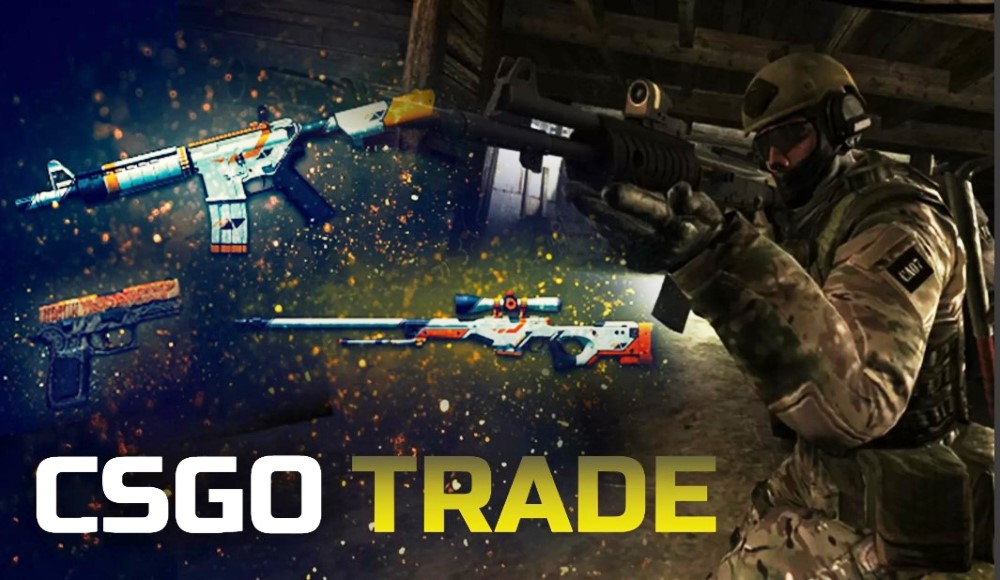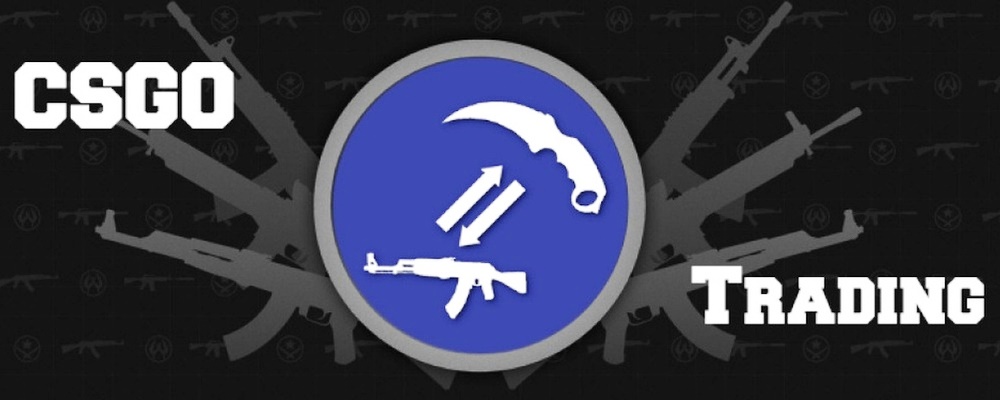
Popular online marketplaces for CS:GO (Counter-Strike: Global Offensive) skins:
- Steam Community Market: This is the official platform provided by Valve, the developer of CS:GO. The benefit of using the Steam Community Market is that it is very secure, and there’s little risk of scamming since it’s fully integrated with the Steam platform.
- Third-party Marketplaces: There are various third-party websites where you can buy and sell CS:GO skins. Some of the popular ones are SkinBaron, Bitskins, and DMarket. These platforms often have lower prices than the Steam Community Market, and they often allow you to cash out your money, unlike the Steam market. But keep in mind, using these platforms carries a certain risk, so be sure to choose a trustworthy site.
- Peer-to-peer Trading: Some players prefer to trade directly with other players. You can do this through various online communities and forums. Always be cautious and aware when trading this way to avoid scams.
Before you proceed with purchasing any skins, please make sure to do the following:
- Research the platform: Understand the reputation of the platform, its security measures, and any associated fees.
- Understand the market: Prices for skins can fluctuate. Some websites provide historical price data, which can be useful for making informed decisions.
- Beware of scams: Unfortunately, the market for CS:GO skins has attracted scammers. Always double-check everything before completing a trade or purchase.
Remember, buying skins won’t give you any advantage in the game; they are purely cosmetic. Make sure to prioritize your real-life financial responsibilities over in-game purchases.
(Note: It’s also important to follow the laws of your country regarding such trades, as some countries have restrictions on these activities.)
Steam Community Market
The Steam Community Market is an official marketplace on the Steam platform where players can buy and sell in-game items, including CS:GO skins. It is operated by Valve Corporation, the developer of CS:GO, which ensures a high level of security and trust.
Here’s how to use the Steam Community Market to purchase CS:GO skins:
- Login to your Steam account: Navigate to the Steam website or open the Steam client on your computer and log in to your account.
- Navigate to the market: In the Steam client, hover over your username at the top of the screen and click on “Community,” then select “Market” from the dropdown menu. On the Steam website, click “Community” in the header, then “Market.”
- Select CS:GO: You’ll see a list of games for which items are available on the market. Click on CS:GO.
- Browse or search for items: You can scroll through the list of available items, or you can use the search function to find a specific skin.
- Choose an item and click on it: You’ll see more information about the item, including its price history and current listings.
- Buy the item: If you decide to buy the item, click “Buy Now.” You’ll have to confirm the purchase and agree to the terms of service.
Please note that any transactions on the Steam Community Market are final and cannot be reversed. The money you spend will go into your Steam Wallet and can only be used within the Steam platform. The items you buy cannot be sold on any other marketplace.
Also, be aware that prices on the Steam Community Market may be higher than on third-party marketplaces due to the convenience and security it offers. It’s always a good idea to check prices on other platforms before making a purchase.
Lastly, Steam imposes some restrictions on new accounts to prevent fraudulent activity. You may need to wait a certain period of time after creating your account, add funds to your Steam Wallet, or make a purchase before you can use the Community Market.

Third-party Marketplaces
Third-party marketplaces are websites or platforms that allow you to buy and sell CS:GO skins outside of the official Steam Community Market. These sites can often offer more competitive pricing and additional features, such as the ability to cash out your earnings in real-world currency.
Here are some popular third-party marketplaces:
- SkinBaron: SkinBaron is a third-party marketplace based in Germany. It offers a secure platform to buy and sell skins for a variety of games, including CS:GO. One of the benefits of SkinBaron is the ability to cash out your balance in real-world currency.
- Bitskins: Bitskins is another reputable third-party marketplace. It offers a wide range of skins and items for various games and also allows users to cash out in real-world currency.
- DMarket: DMarket is a global marketplace for trading in-game items. It allows users to buy, sell, and trade items from a variety of games, including CS:GO.
Please note that while these platforms are popular and generally reputable, using third-party marketplaces does involve a higher degree of risk compared to the official Steam Community Market. Before using any third-party marketplace, you should do your due diligence by researching the platform, reading user reviews, and understanding their policies and security measures.
Also, always ensure that you are visiting the legitimate website for these marketplaces and not a phishing site designed to steal your information. Always check the URL carefully and ensure that the site has a valid SSL certificate (the URL should start with “https://”).
Peer-to-peer Trading
Peer-to-peer trading involves direct transactions between players without the involvement of a centralized marketplace like the Steam Community Market or third-party sites. There are several platforms where players can organize and conduct these types of trades.
Popular sites:
- Steam Trading: This is the most straightforward method. You can directly trade with another Steam user through the Steam platform’s built-in trading feature.
- Online Communities: Various online communities, such as subreddits (like r/GlobalOffensiveTrade on Reddit) and forums (like the CS:GO section of the SteamRep forums), provide a place for players to post trade offers and negotiate terms.
- Discord Servers: Many Discord servers are dedicated to CS:GO trading. Here, you can find trade offers and interact directly with other traders.
When engaging in peer-to-peer trading, keep the following points in mind:
- Security: This method of trading carries the highest risk. Scammers are prevalent in the online trading community. Always verify the identity of your trading partner, and never click on suspicious links or download unverified software.
- Verification: Use services like SteamRep to check the reputation of your trading partner. This can help you avoid scammers.
- Price Checking: Unlike marketplaces that list prices, in peer-to-peer trading, you need to be aware of the value of the skins you’re trading. Use platforms like the Steam Community Market to get an idea of what skins are worth.
- Trade Confirmations: Steam has a trade confirmation feature to help secure trades. Always double-check trade details before confirming.
Always remember, if a deal seems too good to be true, it probably is. Take your time, do your research, and never rush into a trade.
Research the platform
When you’re planning to use a platform for buying or selling CS:GO skins, it’s very important to do some research to ensure it’s reputable and secure.
Here’s a process you might consider:
- Check Official Sources: If the platform is affiliated with a known entity, like a gaming company, check the official website of that entity to see if they acknowledge or endorse the platform.
- Read Reviews: Look for reviews from other users of the platform. You can find these on forums, social media, and sometimes on the platform itself. Keep in mind that both very positive and very negative reviews may be biased or even fake, so look for a consensus among many reviews.
- Investigate Security Measures: A reputable platform will have measures in place to protect your information and your transactions. These might include encryption, two-factor authentication, and escrow services.
- Understand Fees and Pricing: Before you use a platform, you should understand how much it will cost you. This might include transaction fees, withdrawal fees, and the platform’s policy on pricing items.
- Read the Terms of Service: The platform’s terms of service should outline your rights and responsibilities as a user. Make sure you understand and agree with these terms before using the platform.
- Research the Company: Find out where the company is based and who operates it. A reputable platform will be transparent about its operations.
- Check for a Secure Connection: When on the website, check that the URL begins with “https://” rather than “http://”, which indicates that the website uses a secure connection.
Remember that no matter how reputable a platform seems, there’s always some risk involved in online transactions. Be cautious, and don’t spend more money than you can afford to lose.
Understand the market
Understanding the CS:GO skins market can help you make more informed buying and selling decisions.
The market for skins can be volatile, and prices can fluctuate based on a variety of factors. Here are some key points to consider:
- Supply and Demand: Like any market, the CS:GO skins market is influenced by supply and demand. If a skin is rare or highly desired by players, its price will likely be high. On the other hand, if a skin is common or not particularly popular, its price will be lower.
- Condition: CS:GO skins come in different conditions, which can significantly impact their value. These conditions, from best to worst, are: Factory New, Minimal Wear, Field-Tested, Well-Worn, and Battle-Scarred.
- Rarity: Skins also have different levels of rarity, indicated by their color. From most common to rarest, these are: Consumer Grade (white), Industrial Grade (light blue), Mil-Spec (darker blue), Restricted (purple), Classified (pinkish purple), Covert (red), and Exceedingly Rare (gold).
- Stickers and Other Add-ons: Skins with stickers, especially rare or popular ones, can be worth more than those without. Some skins also have StatTrak technology, which counts the number of kills you get with that weapon. StatTrak skins are usually worth more than non-StatTrak ones.
- Market Trends: Pay attention to trends in the market. For instance, the release of new skins or changes in the game meta can influence prices.
- Historical Price Data: Many platforms provide historical price data for each skin, which can help you understand how its value has changed over time.
To stay up-to-date with the market, consider joining online communities of CS:GO traders, such as subreddits or Discord servers. These communities often discuss market trends and provide advice on buying and selling skins.
Remember, however, that predicting market trends can be difficult and risky. Never spend more money on skins than you can afford to lose.
Beware of scams
Scams are unfortunately common in the world of online trading and gaming, including in the CS:GO skin market.
Here are some tips to help you avoid scams:
- Verify the Platform: Make sure you’re using a reputable and secure platform for your trades. This includes checking the website’s URL to ensure you’re not on a phishing site designed to steal your login credentials.
- Double-check Trade Details: Always double-check the details of a trade before confirming it. Make sure the items you’re receiving are exactly what you expect.
- Beware of Too-Good-to-Be-True Offers: If a deal seems too good to be true, it probably is. Be especially wary of people offering to overpay for your items.
- Use Secure Payment Methods: Avoid payment methods that don’t provide any buyer protection, such as wire transfers or gift cards.
- Don’t Share Personal Information: Never share sensitive personal or financial information with other traders.
- Avoid “Middlemen”: Scammers sometimes suggest using a “middleman” or an “escrow service” to hold the items during a trade. These are often scams.
- Be Cautious with Links: Never click on suspicious links sent to you by other traders. These can lead to phishing sites or download malware onto your device.
- Check SteamRep: SteamRep is a website where you can check the reputation of other Steam users. It’s a good idea to check a user’s reputation there before agreeing to a trade.
- Beware of Impersonation: Be aware that scammers may impersonate your friends or reputable traders to trick you into a scam.
- Enable Steam Guard: This is a feature from Steam that adds an extra layer of security to your account.
Despite your best efforts, you may still encounter scammers. If you do, report them to the platform you’re using and to Steam if applicable. Always remember, the best way to prevent scams is to stay informed and vigilant.


